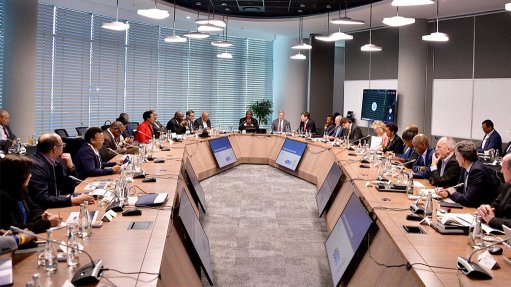
President Cyril Ramaphosa alongside Discovery CEO Adrian Gore at a joint government-business meeting at Discovery Place, Sandton.
Government has committed to finalise a Freight Logistics Roadmap, outlining a sequenced set of actions to fundamentally reform the logistics system, by the end of October.
The commitment was made at a meeting of Cabinet members and senior business leaders held at Discovery Place in Sandton on September 26, chaired by President Cyril Ramaphosa.
In a joint statement following the meeting, government and business reported that their current collaboration in the logistics focal area was centred on ensuring implementation of immediate operational interventions, which had already been defined, alongside the development of the Freight Logistics Roadmap.
Business again emphasised the urgency of the roadmap in the context of the ongoing challenges in the logistics system, with Transnet’s rail business being a particular problem area.
Both business and government, meanwhile, stressed the need to support the Transnet board in its turnaround efforts.
On September 1, Public Enterprises Minister Pravin Gordhan gave the board three weeks to provide him with recommendations and decisions on the operational transformation of the business and to identify the root causes of the inability of management and staff to meet performance targets.
He also demanded a review of the executive management, with a view to establishing “whether persons with the right skills are optimally utilised to deliver on the mandate”.
In a joint statement, government and business also confirmed that six of the eight work streams of the National Logistics Crisis Committee (NLCC) were fully operational, while the remaining two woud transition from Operation Vulindlela to the NLCC.
“Interventions to improve the operational performance of the multimodal bulk freight rail network and port system are well under way through the NLCC.
“Corridor Recovery Teams have been established for five strategic corridors, comprising Transnet managing executives, industry representatives and independent experts, and a delivery plan has been developed with specific actions and timeframes to achieve the targeted increase in freight volumes.”
In addition, a multi-disciplinary team had been formed to address congestion at the Lebombo border crossing, which had reportedly resulted in a reduction in the border processing time.
Law enforcement agencies were also working to protect rail infrastructure through a range of interventions, including aerial surveillance on the North and Central Corridors as well as the Majuba rail line.
Government and business also reported that a dedicated work stream had been established to expedite the restoration of passenger rail services.
ENERGY & CRIME?
The other focus areas being pursued under the collaboration initiated in June related to the ongoing electricity crisis and interventions to tackle crime and corruption.
Progress highlighted in the electricity sector, included:
- delivery, through the National Energy Crisis Committee, on the Energy Action Plan, which should result in over 12 GW of generation capacity being recovered or added to the system by the end of 2024;
- coordination through the Energy Council of South Africa of nearly 130 volunteers from the private sector to work in partnership with Eskom and government, including the deployment of technical support teams at Kendal, Kriel, Majuba, Matla and Tutuka, as well as to support the return of three inoperable Kusile units;
- the tabling of the Electricity Regulation Amendment Bill in Parliament, which had since launched a public comment phase;
- the approval of three licences for the National Transmission Company of South Africa; and
- the establishment of a one-stop shop for energy projects and the signing of a memorandum of understanding with the Energy Council of South Africa to enhance capacity and further streamline regulatory processes.
In the crime and corruption area, the collaboration was focused on building capacity within the National Prosecuting Authority (NPA) and Directorate for Priority Crime Investigation. The NPA Amendment Bill had been tabled to establish the Investigating Directorate as a permanent entity with investigative powers.
Work was also under way with the South African Police Service to address crimes targeting infrastructure and to modernise the 10111-emergency response centre.